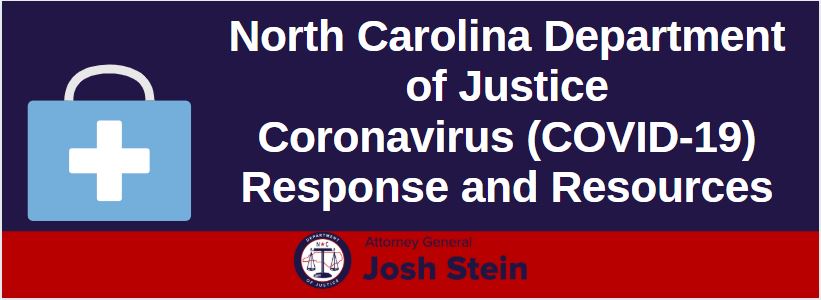Economic Relief

At the Department of Justice, we are focused on protecting North Carolinians during the COVID-19 pandemic. The Department is working hard to keep people safe from scams, fraud, and price gouging. We also know that many people are suffering financially. Below are resources from our governmental partners to help North Carolina’s families dealing with economic hardship caused by the pandemic.
Filing for Unemployment
The North Carolina Division of Employment Security (DES) is providing guidance to help people file for unemployment benefits. If you have experienced issues with contacting DES or submitting information, we understand that DES is addressing capacity and technical issues to better support North Carolinians. More information about obtaining unemployment benefits is available here.
Economic Stimulus Checks
The U.S. Internal Revenue Service is committed to sending economic impact payments as soon as possible. To find out if you are eligible for the payment and to check your payment’s status, please visit the IRS economic impact payment webpage here.
Obtaining Small Business Relief
We understand that the COVID-19 pandemic has caused significant burdens on North Carolinians who are struggling with their health or finances, facing job loss, or working to protect their businesses. The U.S. Small Business Administration offers relief to businesses across the country during the pandemic. Learn more about small business relief here.
Health Insurance Options
If you have recently lost or can no longer afford your health insurance, or even if you are trying to purchase health insurance for the first time, you have options to make sure that you and your family have access to care. Learn more about getting covered here.
Getting Help with Child Care
The North Carolina Department of Health and Human Services (NCDHHS) launched a hotline to provide child care options for children of critical workers who do not have access to typical care because of COVID-19 closures. Workers who need care may call 1-888-600-1685 to receive information about local options for children from infants through age 12. More information is available here.
Finding Food Security
The North Carolina Department of Health and Human Services (NCDHHS) helps North Carolinians find reliable and secure food sources. More information on food security is available here. To find out where the nearest food bank is to you, click here.
Protection from Eviction
Attorney General Stein worked with Gov. Roy Cooper on an executive order supporting Chief Justice Beasley’s order halting foreclosures and eviction hearings for 30 days, barring new eviction proceedings, and encouraging sheriffs to delay performing evictions on previously-issued eviction orders. The Department of Justice has contacted nearly 100 hotels and motels in North Carolina after being notified by community partners that these businesses may be threatening to evict North Carolinians who are living there as their primary residence. If you are being evicted during the state of emergency, please contact Legal Aid NC or a private attorney.
Help with Utility Bills
Attorney General Josh Stein worked alongside Gov. Roy Cooper on an Executive Order to prohibit utilities from disconnecting North Carolinians’ water, gas, and power during this pandemic. Read Gov. Cooper’s executive order here. If your utilities have been cut off due to nonpayment during the state of emergency, please contact the NC Utilities Commission, Legal Aid NC, or a private attorney.
Relief for Student Debt
Student borrowers are facing great economic strains due to COVID-19. The U.S. Department of Education’s Office of Federal Student Aid is taking steps to help ease financial pressures caused by federal student loans and loan payments. Attorney General Stein wrote to Secretary DeVos to urge the Department of Educations to do even more for people with student loans who are suffering economic hardship. More information about student debt relief is available here.
How to Volunteer
If you are able to help other North Carolinians struggling during the pandemic, we encourage you to seek out opportunities to volunteer. More information about volunteering is available here.
